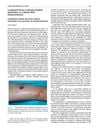32 citations,
July 2001 in “Journal of the American Academy of Dermatology” SLHA can be hard to diagnose and needs teamwork between specialists.
[object Object]  32 citations,
January 2006 in “Acta dermato-venereologica”
32 citations,
January 2006 in “Acta dermato-venereologica” SACUMAN, a rare condition causing hair loss without clear signs, is often misdiagnosed and needs scalp biopsies for accurate detection.
76 citations,
October 2000 in “Journal of the American Academy of Dermatology” Follicular mucinosis can be an early sign of aggressive mycosis fungoides.
 4 citations,
July 2012 in “Dermatologic Clinics”
4 citations,
July 2012 in “Dermatologic Clinics” New biopsy techniques and tools improve alopecia diagnosis, and both too much and too little selenium can cause hair loss.
130 citations,
January 2000 in “Nature biotechnology”  40 citations,
March 1984 in “Acta dermato-venereologica”
40 citations,
March 1984 in “Acta dermato-venereologica” Etretinate has only moderate effects on localized scleroderma and lichen sclerosus.
26 citations,
March 2017 in “Aesthetic plastic surgery” Accidental injection of hyaluronic acid caused temporary hair loss and skin damage, but treatment restored hair and healed the skin.
25 citations,
March 2007 in “The journal of investigative dermatology/Journal of investigative dermatology” A specific gene mutation causes varying hair loss severity in a Pakistani family.
19 citations,
April 2014 in “Veterinary Dermatology” Demodicosis should be considered in cats with facial skin issues exposed to inhalant glucocorticoids.
 16 citations,
July 2002 in “Australasian Journal of Dermatology”
16 citations,
July 2002 in “Australasian Journal of Dermatology” A woman with lupus experienced skin death due to a blood clotting disorder after stopping a blood thinner, which healed with treatment.
13 citations,
August 2005 in “Journal of Investigative Dermatology Symposium Proceedings” Mutations in the DSG4 gene cause fragile, sparse hair in humans, mice, and rats.
 11 citations,
January 2018 in “Annals of Dermatology”
11 citations,
January 2018 in “Annals of Dermatology” Some people experienced temporary hair loss after hair transplant surgery but recovered fully within 10 months.
9 citations,
November 2015 in “JAMA dermatology” A 91-year-old woman's hair turned black in one spot, with skin changes underneath.
5 citations,
October 2012 in “The Journal of Dermatology” Traumatic panniculitis can cause increased hair growth in affected areas.
 5 citations,
September 1986 in “Pediatric Dermatology”
5 citations,
September 1986 in “Pediatric Dermatology” A family showed a new condition with inherited hair loss and skin changes, possibly due to one genetic disorder.
 4 citations,
January 2015 in “Annals of Dermatology”
4 citations,
January 2015 in “Annals of Dermatology” A woman's temporary hair loss after face lift surgery stopped on its own, and hair grew back.
4 citations,
August 2004 in “The Journal of Dermatology” Healing psoriatic plaques can cause unexpected hair growth.
3 citations,
June 2020 in “Journal of Dermatological Treatment” Triamcinolone acetonide is slightly more effective than betamethasone for hair regrowth in localized alopecia areata.
3 citations,
October 2018 in “Journal of cosmetic dermatology” Pentoxifylline alone and combined with triamcinolone acetonide is effective for treating localized alopecia areata, with the combination showing the highest effectiveness.
3 citations,
January 2016 in “Case reports in dermatological medicine” An 80-year-old man grew extra hair on his forearms after starting Alzheimer's medication rivastigmine.
 3 citations,
March 2012 in “Actas Dermo-Sifiliográficas”
3 citations,
March 2012 in “Actas Dermo-Sifiliográficas” An elderly man with skin amyloidosis and abnormal blood proteins was monitored without finding widespread disease after 18 months.
2 citations,
December 2021 in “BMC veterinary research” Long-term use of difluprednate eye drops in dogs can lead to hair loss and hormone imbalance.
 2 citations,
September 2020 in “Dermatologic Surgery”
2 citations,
September 2020 in “Dermatologic Surgery” Hair transplant surgery can cause temporary hair loss in the area where hair was taken from.
2 citations,
March 2007 in “The journal of investigative dermatology/Journal of investigative dermatology” A new type of hereditary hair loss in a Chinese family is linked to chromosome 2p25.1–2p23.2.
 January 2025 in “Dermatology Reports”
January 2025 in “Dermatology Reports” Early and accurate diagnosis is crucial for managing rare genetic disorders like this localized variant of junctional epidermolysis bullosa.
 November 2023 in “PubMed”
November 2023 in “PubMed” Pentoxifylline is a safe and effective alternative to triamcinolone acetonide for treating localized alopecia areata.
 August 2023 in “Acta Scientific Paediatrics”
August 2023 in “Acta Scientific Paediatrics” A baby from an Indian family had a rare genetic disorder causing no scalp or body hair due to a specific gene deletion.
 June 2023 in “Dermatology online journal”
June 2023 in “Dermatology online journal” A person with thyroid problems had rare, swollen, bald spots on their scalp caused by a condition usually found on the shins.
[object Object] 
Both treatments for localized alopecia areata are equally effective.
 January 2023 in “Skin appendage disorders”
January 2023 in “Skin appendage disorders” Hair loss can occur in the area where hair was taken for a transplant.














